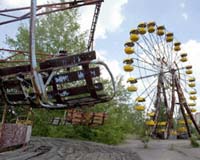 |
Riga (AFP) April 19, 2011 Twenty-five years after he was sent to Chernobyl in the aftermath of the world's worst nuclear disaster, the experience remains etched in the memory of Latvia's President Valdis Zatlers. But the physician-turned-politician still backs atomic energy, and is unfazed by the crisis over Japan's earthquake and tsunami-hit Fukushima nuclear power plant, saying it is crucial to distinguish the two events. "We have to understand there's a technical failure because of technology at a nuclear plant (as at Chernobyl), or a natural disaster at Fukushima," Zatlers told AFP in an interview. Zatlers, now 56, was one of hundreds of thousands of rescue workers sent to Chernobyl in the aftermath of the April 26, 1986 meltdown at the plant. Like Ukraine, where Chernobyl is located, Zatlers' home republic Latvia was part of the Soviet Union at the time -- they won independence when the bloc collapsed in 1991. As it tried to keep the disaster from the eyes of the world, Moscow mobilised resources from across its territory to try to deal with the impact. On May 8, 1986, Zatlers, along with other doctors, was called up by the military to go to Chernobyl, where he spent 60 days. "A 60-day university -- the most important university I've graduated from in my life," he said. "Our task was to clean, which was not a realistic idea, in the area inside the 30-kilometre zone," he explained. The medical workers' task was to monitor safety, with duties including removing dirt from the area and warning people not to eat contaminated local food. While many Chernobyl rescue workers have suffered from health problems such as cancer since then, Zatlers said he has not been affected so far. In 2008, a year after being elected president of his Baltic nation of 2.2 million, Zatlers returned to Chernobyl. "The most impressive was my visit to that same place, 22 years later. And the surrealistic vision of the nuclear power plant. It is in the same condition as it was many decades ago. Abandoned land. No clear future for at least for the next 300 years," he said. Despite that apocalyptic sight, and the Fukushima crisis, Zatlers said he still has faith in atomic energy's future. "Nuclear catastrophes like Chernobyl and Fukushima, they have an impact on the societies all over the world because of the scale and the long-term damage for the environment, but the new power plants will be built when the fear is over," he said. At least three new plants are in the pipeline in the Baltic region. Latvia is involved in a four-nation project to build a new nuclear power station in neighbouring Lithuania to replace a 1980s, Chernobyl-style plant. Lithuania, which like Latvia was also under Moscow's rule until 1991, closed the plant in 2009 under the terms of its 2004 European Union entry. It aims to build a new one by 2020, with fellow ex-communist EU entrants Poland and Estonia also involved in the project, but progress has been sluggish. Ex-Soviet neighbour Belarus, which was hard hit by Chernobyl's radiation, is planning to open its first plant between 2016 and 2020 near its borders with Latvia and Lithuania. Russia, meanwhile, plans to construct a plant in its Baltic territory of Kaliningrad.
Share This Article With Planet Earth
Related Links Bringing Order To A World Of Disasters A world of storm and tempest When the Earth Quakes
 Trauma and controversy: Chernobyl's health legacy
Trauma and controversy: Chernobyl's health legacyKiev (AFP) April 18, 2011 Every year, Volodymyr Palkin spends at least two months in a Kiev hospital. He was one of hundreds of thousands of rescue workers sent to fight the disaster at the Chernobyl nuclear plant and says his health has been permanently ruined by his work. Yet 25 years after the world's worst nuclear disaster on April 26, 1986, huge controversy remains over the true extent of the damage caused to he ... read more |
|
| The content herein, unless otherwise known to be public domain, are Copyright 1995-2010 - SpaceDaily. AFP and UPI Wire Stories are copyright Agence France-Presse and United Press International. ESA Portal Reports are copyright European Space Agency. All NASA sourced material is public domain. Additional copyrights may apply in whole or part to other bona fide parties. Advertising does not imply endorsement,agreement or approval of any opinions, statements or information provided by SpaceDaily on any Web page published or hosted by SpaceDaily. Privacy Statement |